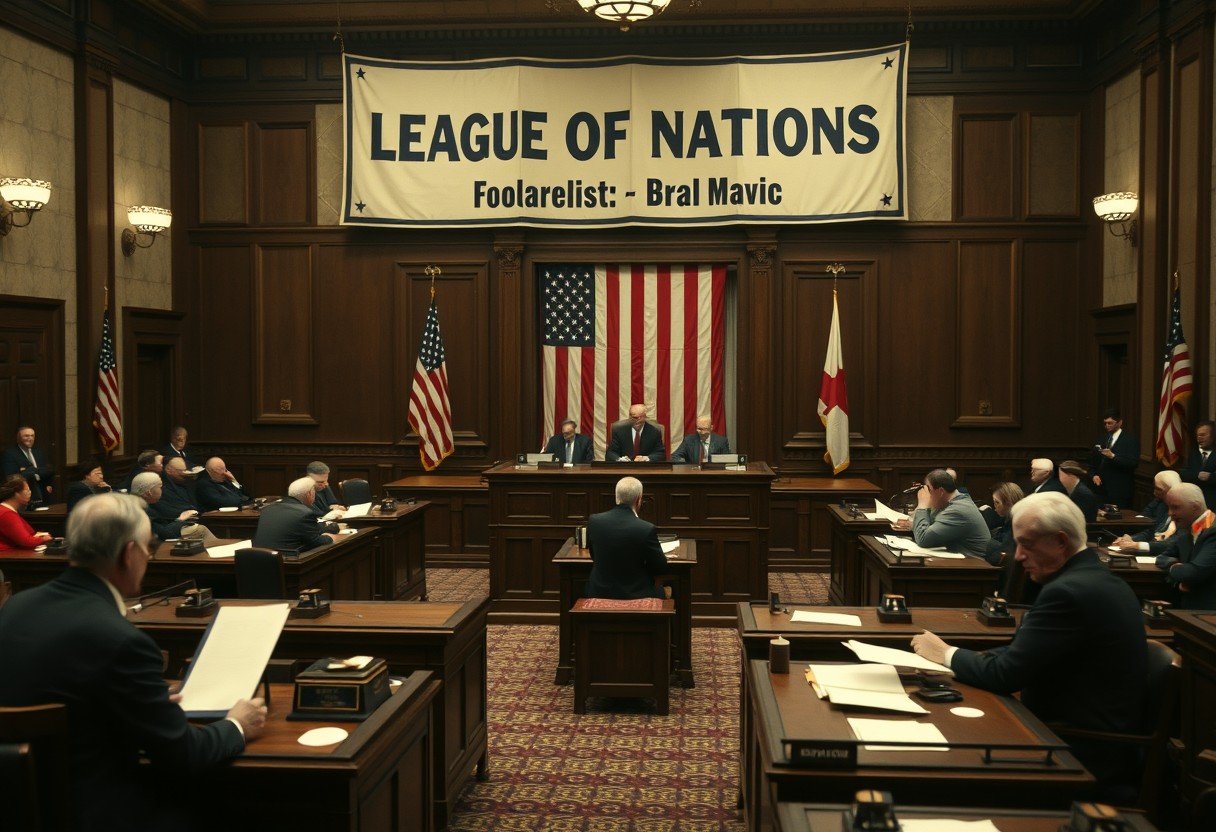After World War I, President Woodrow Wilson championed the League of Nations as a path to global peace. However, his vision met a powerful roadblock at home with Republican isolationists in the U.S. Senate. Their refusal to ratify the treaty was a defining moment, fueled by fears of losing national sovereignty, partisan politics, and a deep-seated desire to avoid foreign entanglements. This decision ultimately kept the United States out of the League, reshaping American foreign policy for decades.
The Prevailing Mood of Isolationism after World War I
Following the immense devastation of World War I, the American public was exhausted. There was a widespread desire to withdraw from complex European politics and focus on issues at home. This sentiment, known as isolationism, became a powerful political force.
Many Americans felt that the country had sacrificed enough in a war that seemed distant from its own core interests. The return of soldiers to a challenging economy only strengthened the call to return to “normalcy.”
This public mood gave Republican senators the political cover they needed to challenge Wilson’s internationalist agenda. They argued that America’s security and prosperity depended on staying out of the affairs of other nations, a message that resonated deeply with a war-weary population.
Fears Over National Sovereignty and Independence
The central argument of the Republican isolationists was that the League of Nations threatened American sovereignty. They were deeply concerned that membership would require the United States to give up its ability to make independent foreign policy decisions.
The most contentious part of the League’s charter was Article 10. This provision called on member nations to defend the territory and independence of any other member that came under attack. To opponents, this was a major red flag.
Isolationists, led by prominent figures like Senator William Borah, argued that Article 10 created an open-ended military commitment. They believed it would strip Congress of its constitutional power to declare war, effectively forcing the U.S. into future conflicts without the consent of its own elected officials. This potential loss of self-determination was the primary reason for their firm opposition.
The Role of Partisan Politics and Personal Rivalry
Beyond ideological differences, the fight over the League of Nations was intensely personal and political. President Woodrow Wilson, a Democrat, had a deeply antagonistic relationship with key Republican leaders, most notably Senator Henry Cabot Lodge.
Lodge, the Chairman of the Senate Foreign Relations Committee, viewed Wilson as arrogant and refused to let him dictate the terms of America’s post-war role. He believed the League was a flawed, Wilsonian project that needed significant changes, if not outright rejection, to protect American interests.
The political rivalry turned the ratification debate into a bitter partisan struggle. Many Republicans saw defeating the League as a way to undermine Wilson’s presidency and reassert their party’s control over foreign policy. This political maneuvering played a crucial role alongside the genuine concerns about sovereignty and military obligations.
Key Concerns Raised by the Opposition
Republican isolationists articulated several specific objections to the League of Nations during the heated Senate debates. Their arguments were designed to appeal to both national pride and the public’s fear of another war.
Their primary objections included:
- Collective Security: The commitment under Article 10 to defend other nations was seen as a dangerous entanglement that would drag the U.S. into endless European disputes.
- Loss of Autonomy: They feared that an international body could dictate American foreign and military policy, undermining the nation’s independence.
- Doubts About Effectiveness: Many questioned whether the League would actually be powerful enough to prevent future wars, seeing it as a toothless organization unable to enforce its decisions.
These arguments successfully tapped into the post-war anxiety of the American people, making it difficult for President Wilson to rally the public support needed for ratification.
Long-Term Consequences of U.S. Rejection
The United States’ failure to join the League of Nations had profound and lasting consequences. Without the participation of the world’s rising economic and military power, the League’s credibility and effectiveness were severely hampered from the start.
Many historians argue that the absence of the U.S. weakened the League’s ability to confront the aggressive actions of nations like Japan, Italy, and Germany in the 1930s. This instability is often cited as a contributing factor to the outbreak of World War II.
For the United States, the decision reinforced an isolationist foreign policy that lasted until the attack on Pearl Harbor. The rejection of the League marked a retreat from global leadership, a position the nation would not fully embrace until after the Second World War. This period showed the significant challenges of balancing national interests with the need for international cooperation.
Historical Isolationism vs. Modern Internationalism
The debate over the League of Nations highlights a fundamental tension in American foreign policy that still exists today: the pull between isolationism and internationalism. Understanding the historical context provides valuable insight into contemporary discussions about global engagement.
Here is a comparison of the core ideas:
| Isolationism (Early 20th Century) | Internationalism (Modern View) |
|---|---|
| Prioritizes national sovereignty above all else. | Emphasizes the need for global cooperation. |
| Fears entanglement in foreign conflicts. | Advocates for collective security through alliances. |
| Promotes limited foreign aid and military intervention. | Supports humanitarian aid and active diplomacy. |
Reflecting on the past helps us understand the importance of finding a balance between protecting national interests and fulfilling global responsibilities in an interconnected world.
Frequently Asked Questions
What were the main reasons Republican Isolationists opposed the League of Nations?
They primarily opposed the League over concerns that it would compromise U.S. national sovereignty, entangle the nation in foreign conflicts through Article 10, and undermine Congress’s constitutional power to declare war.
Who was the main opponent of President Wilson’s League of Nations?
Senator Henry Cabot Lodge, a Republican from Massachusetts, was the most influential opponent. As the Senate Majority Leader and Chairman of the Foreign Relations Committee, he led the successful campaign to block ratification of the treaty.
What was Article 10 of the League Covenant?
Article 10 was the collective security provision of the League’s charter. It required member nations to respect and preserve the territorial integrity and political independence of all other members against external aggression, which opponents saw as an automatic commitment to war.
Did public opinion influence the Senate’s decision?
Yes, public sentiment played a significant role. After World War I, many Americans were wary of further international commitments and favored isolationism, which provided strong political support for the Republican senators opposing the League.
What happened because the U.S. did not join the League of Nations?
The absence of the United States weakened the League’s authority and effectiveness. It contributed to the organization’s inability to prevent aggression in the 1930s, and for the U.S., it cemented an isolationist foreign policy that lasted until World War II.









Leave a Comment